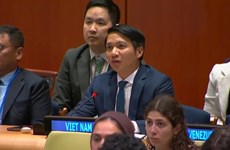Australia assists landmine victims in VN, Laos
Australia has announced 4 million AUD for the work of ICRC Special Fund for the
Disabled in Vietnam.
Australia has announced 4 million AUD over four years for the work of
the International Committee of the Red Cross (ICRC) Special Fund for the
Disabled in Vietnam and other mine affected countries.
The Australian Department of Foreign Affairs and Trade (DFAT) said on April 13 that Foreign Minister Kevin Rudd made the announcement during a visit to the Ho Chi Minh City Orthopaedic and Rehabilitation Centre, as part of his trip to Vietnam .
The Australian assistance will provide rehabilitation services and improve the quality of life for thousands of people injured by landmines in Vietnam and Laos .
" Vietnam is one of the most mine contaminated countries in the region with an estimated 100,000 mine survivors. Over 20 percent of the country is estimated to contain some 800,000 tonnes of explosive remnants of war which continue to kill and maim scores of Vietnamese every year", said the minister.
He added that this new investment in the ICRC Special Fund for the Disabled will help centres such as this assist more men and women with prostheses and rehabilitation, giving them the opportunity to work to support their families and fully participate in their communities.
It builds on more than 5 million AUD Australia has invested in ICRC’s work in Vietnam and other mine affected countries since 2006, which has provided rehabilitation services to over 17,000 people.
Australia will also invest 2.5 million AUD through the Convention on Cluster Munitions Trust Fund of Laos. This will assist the Lao government clear unexploded ordnance from heavily contaminated land - a legacy of the two million tonnes of ordnance dropped on the country during the Indochina conflict.
"This Australian support will mean that thousands more families will be able to farm on cleared land and hundreds of boys and girls can walk safely to school without the risk of terrible injury or death," Minister Rudd said.
Since 2006, Australia has helped clear unexploded devices from more than 5 million sq.m of Laos, benefiting over 17,000 people living in contaminated provinces and providing access to rehabilitation services for over 12,000 vulnerable people./.
The Australian Department of Foreign Affairs and Trade (DFAT) said on April 13 that Foreign Minister Kevin Rudd made the announcement during a visit to the Ho Chi Minh City Orthopaedic and Rehabilitation Centre, as part of his trip to Vietnam .
The Australian assistance will provide rehabilitation services and improve the quality of life for thousands of people injured by landmines in Vietnam and Laos .
" Vietnam is one of the most mine contaminated countries in the region with an estimated 100,000 mine survivors. Over 20 percent of the country is estimated to contain some 800,000 tonnes of explosive remnants of war which continue to kill and maim scores of Vietnamese every year", said the minister.
He added that this new investment in the ICRC Special Fund for the Disabled will help centres such as this assist more men and women with prostheses and rehabilitation, giving them the opportunity to work to support their families and fully participate in their communities.
It builds on more than 5 million AUD Australia has invested in ICRC’s work in Vietnam and other mine affected countries since 2006, which has provided rehabilitation services to over 17,000 people.
Australia will also invest 2.5 million AUD through the Convention on Cluster Munitions Trust Fund of Laos. This will assist the Lao government clear unexploded ordnance from heavily contaminated land - a legacy of the two million tonnes of ordnance dropped on the country during the Indochina conflict.
"This Australian support will mean that thousands more families will be able to farm on cleared land and hundreds of boys and girls can walk safely to school without the risk of terrible injury or death," Minister Rudd said.
Since 2006, Australia has helped clear unexploded devices from more than 5 million sq.m of Laos, benefiting over 17,000 people living in contaminated provinces and providing access to rehabilitation services for over 12,000 vulnerable people./.













